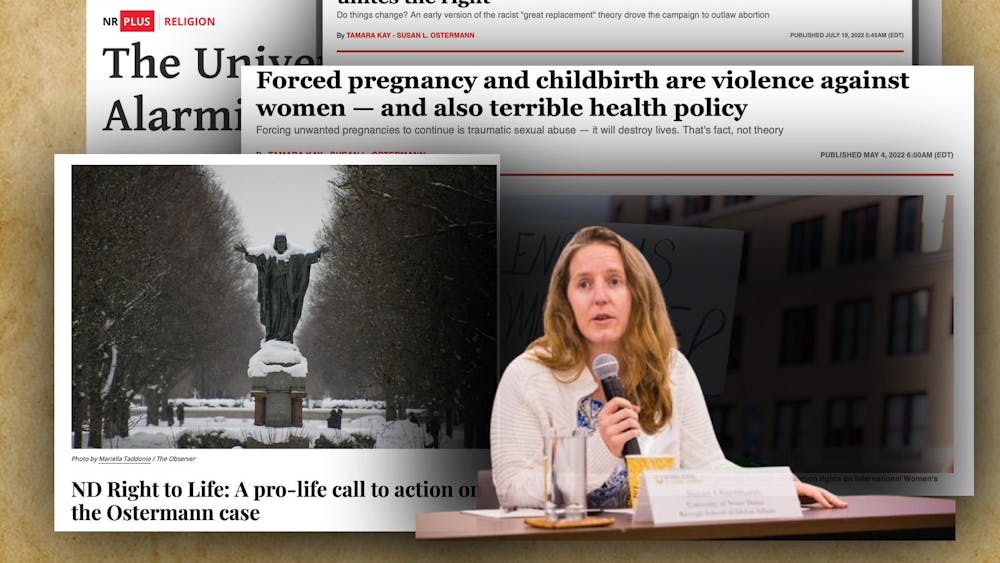In a letter published in The Observer on March 18 entitled, “Objections to the Laetare Medal Decision,” several students criticized the University and its administrators, specifically Fr. Jenkins, for their decision to award the Laetare Medal to Vice President Joe Biden and former Speaker of the House John Boehner. The authors of the aforementioned article objected heavily to Biden’s reception of the award, with little to no evaluation of Boehner’s right to the same honor. The letter states that “giving the award to Speaker Boehner at the same time [it is given to Biden] does not alleviate the scandal committed by the University,” suggesting Boehner deserves the award.
The letter focuses on Biden’s stance on two contentious issues: same-sex marriage and abortion. The authors are correct in one sense: Biden’s views on both issues run contrary to Church teachings. This is irrefutable. However, the authors mysteriously neglect to mention Boehner’s own political positions, including both their practical implications, and consistencies with Church doctrine. Yes, Boehner’s views on same-sex marriage and abortion align with those of the Church. Despite this, his political positions regarding immigration, environmental issues and capital punishment are lacking in the face of Catholic Social Teaching (CST).
On the issue of immigration, CST maintains that individuals have the right to "migrate to sustain their lives and the lives of their families." CST also calls on countries to "regulate their borders with both justice and mercy." On any given day, roughly 30,000 illegal immigrants face detention in the United States with the threat of deportation and separation from their families. In 2013, Boehner infamously refused to hold a House vote on a bipartisan comprehensive immigration reform bill — despite it having enough votes to pass — in an effort to appease his far-right colleagues. The bill would have provided a path to citizenship and deportation relief for productive workers and children. Additionally, House Republicans under Boehner’s leadership have approved bills that would terminate the Deferred Action Childhood Arrivals (DACA) program, effectively eliminating deportation relief for over 500,000 young immigrants. These are just a few examples of Boehner’s failure to live out his Catholic faith by acting compassionately toward those who have “migrated to sustain their lives.”
The Church’s stance on environmental issues has always been made crystal clear. Pope Francis’ 2015 encyclical, “Laudato Si’,” addresses climate change, calling global warming the product of “great concentration of greenhouse gases released mainly as a result of human activity.” In his final encyclical, "Caritas in Veritate," Pope Benedict notes that “the protection of the environment, of resources and of the climate obliges all international leaders to act justly and to show a readiness to work in good faith.” Despite these Papal addresses, Boehner voted against both the enforcement of CO2 pollution limits and tax credits for investors in renewable energy. In 2009, Boehner wavered in acknowledging human contribution to global warming, stating that the “idea that carbon dioxide is a carcinogen that is harmful to our environment is almost comical.”
Finally, both Boehner and Biden have actively supported the death penalty. Boehner, by voting “no” on a bill that would have changed death penalty sentences to life imprisonment and by voting to suspend the rights of habeas corpus in death penalty appeals cases. These positions blatantly ignore the Church’s stance on the right to life — a concept the previous viewpoint’s authors argue so passionately for.
Both the assessment and challenge of the worthiness of Laetare Medal recipients is certainly important. After all, the University touts it as “the oldest and most prestigious award for American Catholics.” However, in failing to equally examine both recipients of the award, the issue is placed under a staunchly partisan lens, only giving a greater voice to Fr. Jenkins’ warning that those “who disagree often will vilify, attack, demean the opposition and [thereby] cannot work with the opposition,” which causes an “impasse of acrimony of intransigence” that “doesn’t serve society.” While “attack” and “demean” are perhaps strong words to describe the previous viewpoint’s criticisms of Biden, their critiques undoubtedly fall the hardest on the political left’s nominee and ignore the right’s, despite the numerous disparities between both awardees’ stances and those of the Catholic Church. Such obvious partisan bias leads to an unfair assessment of the issue and fails to contribute any constructive commentary regarding how the University should award the Laetare Medal.
Performing thorough reviews of the honorees is an important exercise. However, it is unproductive to do so when one maintains a preference for certain ideologies and issues. We do not wish to endorse or refute either awardees’ worthiness to receive this honor, but simply calls on dissenters of the University’s decision to acknowledge the importance of all Catholic Social Teachings, not simply those they believe are the most important.
Jake Maginn
sophomore
Micaela Powers
sophomore
Catholic Social Teaching and Laetare honorees
The views expressed in this column are those of the author and not necessarily those of The Observer.









